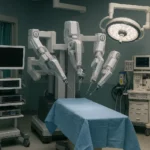A New Era in Multiple Sclerosis Care: Exploring Advanced Therapies
Multiple Sclerosis (MS) is an autoimmune disorder that involves the nervous system and leads to mobility, vision, fatigue and cognitive impairment. MS is caused by the body’s immune system attacking and damaging the insulation around the nerves called the myelin, leading to inflammation and damage. That’s why many patients are now exploring Advanced MS Treatment India as a progressive solution.
Treatment of multiple sclerosis over the years has been slowing the progression of the disease with medicine and symptom management. New technologies in gene therapy, stem cell therapy and remyelination methods are on the horizon. The therapies have the potential to repair the damaged nerves and alter the treatment approach for MS.
Symptoms of Multiple Sclerosis
Multiple Sclerosis can affect the body in many ways—here are some of the most common and important symptoms to watch for:
- Weakness and Fatigue
Feeling tired even after rest, with muscles often feeling weak or heavy. - Muscle Spasms and Stiffness
Painful muscle cramps or tightness, especially in the legs or back. - Vision Problems
Blurred or double vision, sometimes with pain when moving the eyes. - Numbness and Tingling
A “pins and needles” feeling, especially in the arms, hands, legs, or face. - Poor Balance and Coordination
Trouble walking, frequent falls, or feeling unsteady on your feet. - Memory Loss and Confusion
Forgetfulness, slow thinking, or difficulty focusing on daily tasks. - Bladder and Bowel Issues
Urgent need to urinate, leakage, or constipation can be common in MS. - Speech or Swallowing Problems
Slurred speech or trouble swallowing may happen in advanced cases. - Mood Swings or Depression
MS can also affect emotions, causing mood changes or ongoing sadness.
Multiple Sclerosis Causes
The cause of MS is not known, though risk factors are:
- Autoimmune Reaction
The body’s immune system mistakenly attacks the protective layer of nerves (myelin), causing damage.
2. Family History
Having a close relative with MS may increase your chances of developing the condition.
3. Vitamin D Deficiency
Low levels of vitamin D, often due to lack of sunlight, are linked to a higher MS risk.
4. Viral Infections (e.g., Epstein-Barr Virus)
Some viruses may trigger MS by affecting the immune system over time.
5. Smoking
Smoking is known to worsen MS symptoms and may even contribute to its development.
6. Gender and Age
MS is more common in women and usually appears between the ages of 20 and 40.
7. Geographic Location
People living in colder or less sunny regions tend to have a higher risk of MS.
Multiple Sclerosis Diagnosis
Diagnosis of MS takes the form of a series of tests such as:
- MRI scan to look for lesions on the brain and spine.
- Spinal tap to look for abnormal immune responses.
- Evoked potential testing to assess the transmission speed of nerve signals.
Early treatment enables patients to be treated before excessive nerve damage.
Modern Multiple Sclerosis Treatments and Their Shortcomings
Treatment of most multiple sclerosis is focused on minimizing symptoms and slowing the disease’s progression:
- Disease-Modifying Therapies (DMTs): Prevent immune attacks on nerves.
- Steroids: Minimize inflammation during MS attacks.
- Muscle relaxants & pain medication: Relieve muscle stiffness & pain.
These medications do not stop MS entirely and are side-effect-inducing too. That is why scientists are considering stem cell therapy and gene therapy for better, long-term treatments.
Breakthroughs Behind Advance MS Treatment
1. Stem Cell Therapy: The MS Treatment Breakthrough
Currently, one of the most promising MS choices is autologous stem cell transplant, and one of the contenders for this is hematopoietic stem cell transplantation (HSCT).
How it works:
- Hematopoietic stem cells (blood cells) are removed from the patient.
- The immune system is “reset” through chemotherapy.
- Re-infused are normal stem cells to create a non-hostile immune system.
Pros: Some patients experience long-term remission and fewer relapses.
Cons: Costly, hospitalization, not yet on mass application.
Stem cell therapy is also researched for remyelination, which is used to restore myelin and repair nerve injury.
2. Gene Therapy: A Future-Defining Treatment
Gene therapy is an emerging therapy that attempts to restore the breakdown of the immune system at the gene level.
CRISPR Gene Therapy: Allows researchers to “edit” genes, which could stop MS development.
Follistatin Gene Therapy: In trials to possibly reduce inflammation and improve muscle function.
Gene Therapy: Advantage and Disadvantage
✅Committed to providing lasting relief for multiple sclerosis and autoimmune conditions.
❌ Expensive and ongoing clinical trials.
Researchers are applying gene therapy in other areas, including cancer gene therapy, sickle cell gene therapy, and various cell and gene therapies.
3. Other New MS Treatments
Other new treatments apart from stem cell therapy and gene therapy include:
- Monoclonal antibodies: Treat the immune system to avoid nerve damage.
- Nanotechnology in Medicine: Utilizes small drug carriers to treat specific nerves.
- Gut Microbiome Therapy: Studies show that bacteria in the gut might be causing MS and could be potential candidates to target with probiotics.
These therapies are undergoing clinical trials but give MS patients great hope.
What These Breakthroughs Mean to MS Patients
With advances in treatments like stem cell therapy, gene therapy and remyelination therapy, MS sufferers have never had higher hopes for improved outcomes than they have at present. These advancements potentially mean:
- Lessened symptoms and decreased relapses
- Increased duration of remission
- Treatment of poor MS
- Regeneration of nerve and enhanced potential for mobility
The majority of these therapies are currently in clinical trials and are not yet mainstream. It is of importance that patients stay well-informed, go for clinical trial participation, and discuss these possibilities with physicians.
Remyelination: A Key Pillar of Advance MS Treatment
- Remyelination is a new approach where treatments aim to regrow the protective layer (myelin) around nerves damaged by MS.
- Researchers are developing medicine and cell-based therapies that boost the body’s ability to repair myelin naturally.
- If successful, these therapies could reverse some nerve damage, improving symptoms like mobility, fatigue, and coordination.
- Though still under trial, this method gives hope for long-term recovery and better function in MS patients.
Gut Health and Its Role in Advance MS Treatment
- Studies show that gut bacteria (microbiome) may influence the immune system and play a role in triggering or worsening MS.
- Some researchers believe that balancing gut bacteria through diet, probiotics, or fecal transplants could help reduce inflammation in the brain.
- Though early in research, this connection could lead to new, non-invasive treatment options in the future.
- Managing gut health might not cure MS but could become part of a holistic care plan for patients.
MS and Lifestyle Changes: What You Can Do Beyond Medication
- While medical treatments are essential, daily habits also impact MS progression and quality of life.
- Regular exercise, healthy eating, stress management, and adequate sleep help reduce fatigue and support nerve health.
- For example, patients who stay active and manage stress often experience fewer flare-ups and better symptom control.
- Empowering MS patients with lifestyle tools can offer greater independence and hope in managing their condition long-term.
What Research Says About MS Treatment
Research in recent years has opened new doors for Multiple Sclerosis (MS) treatment. While traditional medications only manage symptoms, new therapies like stem cell and gene therapy are showing real promise in changing the future of MS care.
- Stem cell therapy is helping some patients experience long-term remission and fewer relapses by resetting the immune system.
- Gene editing tools like CRISPR may one day correct the faulty immune response that causes MS.
- Remyelination research is underway, with the goal of repairing damaged nerve coverings (myelin) and improving movement and coordination.
- Gut microbiome studies show that balancing gut bacteria could support immune health and reduce MS flare-ups.
- Ongoing clinical trials worldwide, including in India, are testing these breakthrough approaches—bringing hope for safer and more lasting treatments.
Why Should You Choose Regimen Healthcare for MS Treatment in India?
If you’re seeking breakthrough MS treatments, Regimen Healthcare ensures you receive the best care—every step of the way.
- Access to Top Hospitals & MS Specialists
We connect you with India’s best hospitals and expert neurologists specialized in treating multiple sclerosis. - Full Travel & Medical Support
From visa approval to booking flights, hospital appointments, and hotel stays—we manage it all for you. - Affordable Advanced Therapies
We help you access cost-effective stem cell and gene therapies without compromising on quality. - 24/7 Patient Assistance
Our care team supports you round-the-clock—before, during, and after your treatment journey. - Personalised Treatment Plans
Every patient receives a custom plan based on their health, symptoms, and treatment goals. - Multilingual Coordinators
Our team speaks your language—Arabic, French, Russian, Bangla, and more—so communication is smooth and stress-free. - Safe, Trusted Recovery Options
We ensure you have a clean, secure place to stay near the hospital with everything arranged in advance. - Post-Treatment Follow-Up
Even after you return home, we arrange remote consultations and help track your progress.
Why Should You Choose Treatment of MS in India?
India is becoming a global leader in advanced MS care—trusted by patients from all over the world.
- Personalized Attention
Patients receive one-on-one care, with care managers and multilingual teams available throughout the journey.
2. World-Class Advanced Therapies
India offers cutting-edge stem cell and gene therapy in top-tier, internationally accredited hospitals.
3. Experienced MS Neurologists
Indian specialists have years of experience treating MS with advanced and personalized methods.
4. Affordable Treatment Costs
MS treatment in India is up to 70% cheaper than in the US or Europe—without compromising quality.
5. International Patient Support
Hospitals offer visa help, interpreters, and follow-up care tailored for overseas patients.
6. Shorter Waiting Times
Unlike Western countries, treatment in India begins quickly—no long delays or queues.
7. Safe & Comfortable Environment
Special recovery accommodations, caregiver support, and hospital stays are designed for patient comfort.
8. Proven Success Stories
Thousands of patients have already experienced major improvements in India’s MS programs.
Conclusion
Multiple Sclerosis (MS) is a tough condition, but medical science is making progress. Researchers are already exploring gene therapy and stem cell treatments, and these are just the beginning.
While these new treatments are still being developed, there’s real hope for better, longer-lasting options in the near future.
For now, it’s important for people living with MS to stay updated, talk regularly with their doctors, and explore clinical trials if possible.
MS treatment is moving forward—and with it, hope is growing stronger every day.
Start Your Road To Better Health for MS Treatment in India
If you, or someone close to you, are seeking cutting-edge Multiple Sclerosis treatment, let Regimen Healthcare be your way to the best solutions.
Have questions? Our team is ready to assist you—contact us now.
Call/WhatsApp: +91-9310356465
E-mail: [email protected]
Visit our website: www.regimenhealthcare.com
A new dawn for MS patients is coming—begin the journey to a brighter tomorrow with Regimen Healthcare!
Frequently Asked Questions (FAQs)
- Is stem cell therapy for MS available in India?
Yes, India’s best hospitals offer autologous stem cell transplants for MS patients.
- How effective is gene therapy for MS?
Gene therapy is in clinical trials but has huge potential to stop the progression of MS.
- How costly is treatment for MS in India?
Prices vary, but it is very affordable in India versus the US or Europe. Call us to estimate the cost in total.
- Is MS curable?
There is no cure, but there are therapies like stem cell therapy and gene therapy that can slow down the process of the disease and improve the quality of life.
- How do I start my treatment with Regimen Healthcare?
Simple as calling us with your medical reports, and our specialists will take care of the rest.
6. Can stem cell therapy help with MS?
Yes, stem cell therapy can help reset the immune system and reduce disease progression, though it’s still in trials and not widely available.
7. Is gene therapy a potential treatment for MS?
Gene therapy aims to modify genes to stop MS progression. It’s still in clinical trials but shows potential for long-term management.
8. What kind of support will I receive during MS treatment?
To ensure this, we provide 24/7 support, handling everything from visa arrangements to post-treatment care for a smooth experience.









